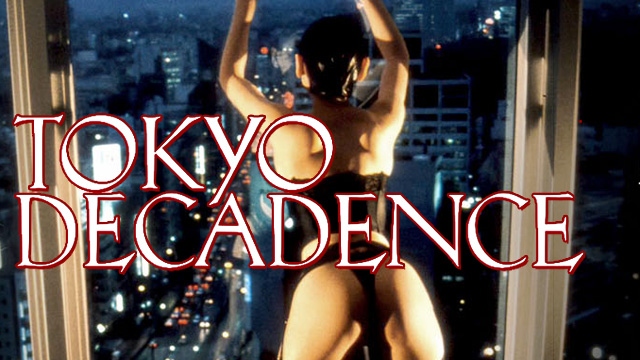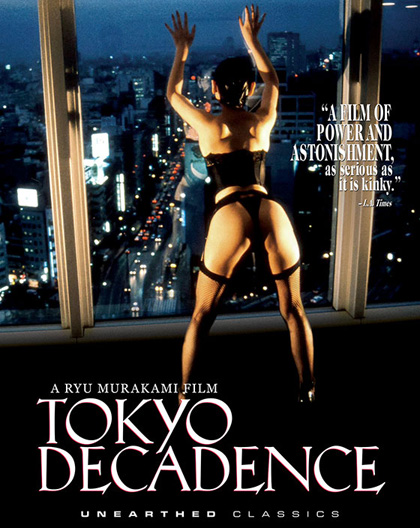

Monday February 28, 2022 | Buckners reviews | Neal
Tokyo Decadence (1992)– a film review by Andrew Buckner
Get "Tokyo Decadence" from Unearthed Films today!
UnearthedFilms.com/catalog/classics/tokyodecadence
Tokyo Decadence (1992), from writer-director Ryu Murakami, is remarkably subtle despite its taboo topics of prostitution and sexuality. The work approaches these elements, especially the latter, in a clinical, detached yet highly aesthetically driven and visually spectacular manner. It is one which calls to mind Pier Paolo Pasolini’s controversial masterpiece, Salo, or the 120 Days of Sodom (1975), and the equally memorable In the Realm of the Senses (1976) from director Nagisa Oshima. The NC-17-rated and frequently banned exercise is also a consummate character study. It is one which is smartly crafted in the “show over tell” school of filmmaking. Murakami deliberately keeps his central figure, 22-year-old Ai (Miho Nikaido), enigmatic. Audiences become passive in so doing, much as Ai is forced to be throughout her daily tribulations. This is as she suffers an exhaustive catalogue of occupational abuses for the sake of her opulent customers’ pleasure. It is an idea that far too many laborers can relate to regardless of profession.
This lack of development on Ai’s behalf is also one of the various brilliant moves Murakami makes in forming Tokyo Decadence in a style that is as organic and credible as possible. Such a touch also amends theater patrons an opportunity to see Ai, whose name means love in Japanese, in the shadowy, uncared for, and societally looked-down-upon way Ai’s clients often view her. It is also a mirror into how the lead of the chronicle, who is desperately trying to find her place in the world, observes herself. The 112-minute picture shifts through its first two acts in this compelling and forthright modus. In the concluding 25 minutes, the message of alienation Murakami is powerfully painting on celluloid becomes even more perceptible. This is as we witness how the effects of both her personal and professional life coincide in the most catastrophic means imaginable.
Some may deem this climactic passage as “aimless”. This is as it showcases Ai dazedly attempting to enter the home of her ex-lover after consuming a supposedly “magic” capsule. Via the mundane actions that emerge during this stretch, such as an unexpected meeting with an opera singer and an encounter with curious cops, this portion enthrallingly illustrates Ai’s listlessness and sorrow. It is most apparent during her muted response to the seemingly arbitrary incidents that occur. This lengthy interval also showcases her disconnection to what is transpiring while freshly punctuating her accumulating grief. Though the post-credits dance bit comes across as unnecessary, it is well within the bounds of the surreal randomness that engulfs the third act.
Faithfully adapted from the book Topaz (1988) by Murakami, a title which Tokyo Decadence is placed under in some areas beyond of The United States, Murakami’s fifth flick concerns Ai learning that her romantic entanglement, a gallery artist, is married. From the anguish she experiences from this realization, she yearns for newfound purpose. In so doing, she delves into her trade as a submissive call girl. Disappointed with her job and her existence, she undergoes humiliation and abuse from her patrons to quell her internal torment.
Through the description of this narrative alone, one can easily see the alignment of the inward unhappiness Ai is undergoing manifested through exterior physical suffering. Yet, Murakami successfully executes the accessibility of these symbolic bits with the natural, logical progression and structure of the casually paced plot. Thus, he shapes this admittedly thin chain of events into a far more layered, thoughtful, and honest construction than it might be in less capable hands. The authentic dialogue, which is teamed with how readily spectators comprehend Ai’s turmoil while sentimentality is kept below the surface, is one of the virtuoso traits of the ever-confident taletelling. This is as much a courtesy of the literate, top-notch screenplay as it is the immersive, elegant direction from Murakami.
Such a magnetic quality also stems from the vulnerable, innocent, and always captivating main turn from Nikaido. She is riveting and purely believable from the first frame to the last in her enactment. Her shy, wounded yet silently aggressive spin on Ai is perfect for the role. The other depictions from the varied and sharply chosen cast, including Sayoko Amana as Saki and Tenmei Kano as Ishioka (Mr. Satoh), are just as deft and plausible.
The mesmerizing cinematography from Tadashi Aoki beautifully matches the voyeuristic tone of the piece. It is incredibly vivid at times. For instance, there is a simple scene that occurs six minutes into the project. It focuses on Ai using a bright red phone outdoors. The rosy color in this quick flash is one of the numerous instances where this high-functioning aspect is most evident. It is comparatively diminished, and more of a smoky hue, during the more darkly lit sequences of carnality. Nevertheless, it is still immensely impressive and fitting to the atmosphere of the article.
Moreover, the music from Ryuichi Sakamoto is superb. It tastefully reiterates the delicate methodology Murakami infuses into the venture. Kazuki Katashima implements editing that is as fluent as it is extraordinary. To be fair, the bulk of the segments unveiled in the attempt are far longer than what one would usually see in a standard feature. Still, they are never overlong. The sound, camera handling, and lighting are just as exemplary.
Murakami, who also penned the terrific short novels Piercing (1994) and Audition (1997), has woven his most accomplished behind the lens effort with Tokyo Decadence. Though one of the situations involving an intoxicated man near the 50-minute mark is more goofy than effective, the sheer variety Murakami gives to Ai’s customers and their whims continually flavors the offering. It is also a large part of the impeccable building of Ai’s lonely world which Murakami so painstakingly erects in this endeavor. In turn, Murakami’s bold opus is great cinematic art stripped of the inhibitions, faux reassurances, and cliches that so regularly dominate these stories when presented on-screen. Ultimately, the theme of the dark side of our collective culture Murakami unapologetically explores herein is as timeless as the movie from which it takes root.
Tokyo Decadence receives ***** out of ***** on The Buckner Scale.